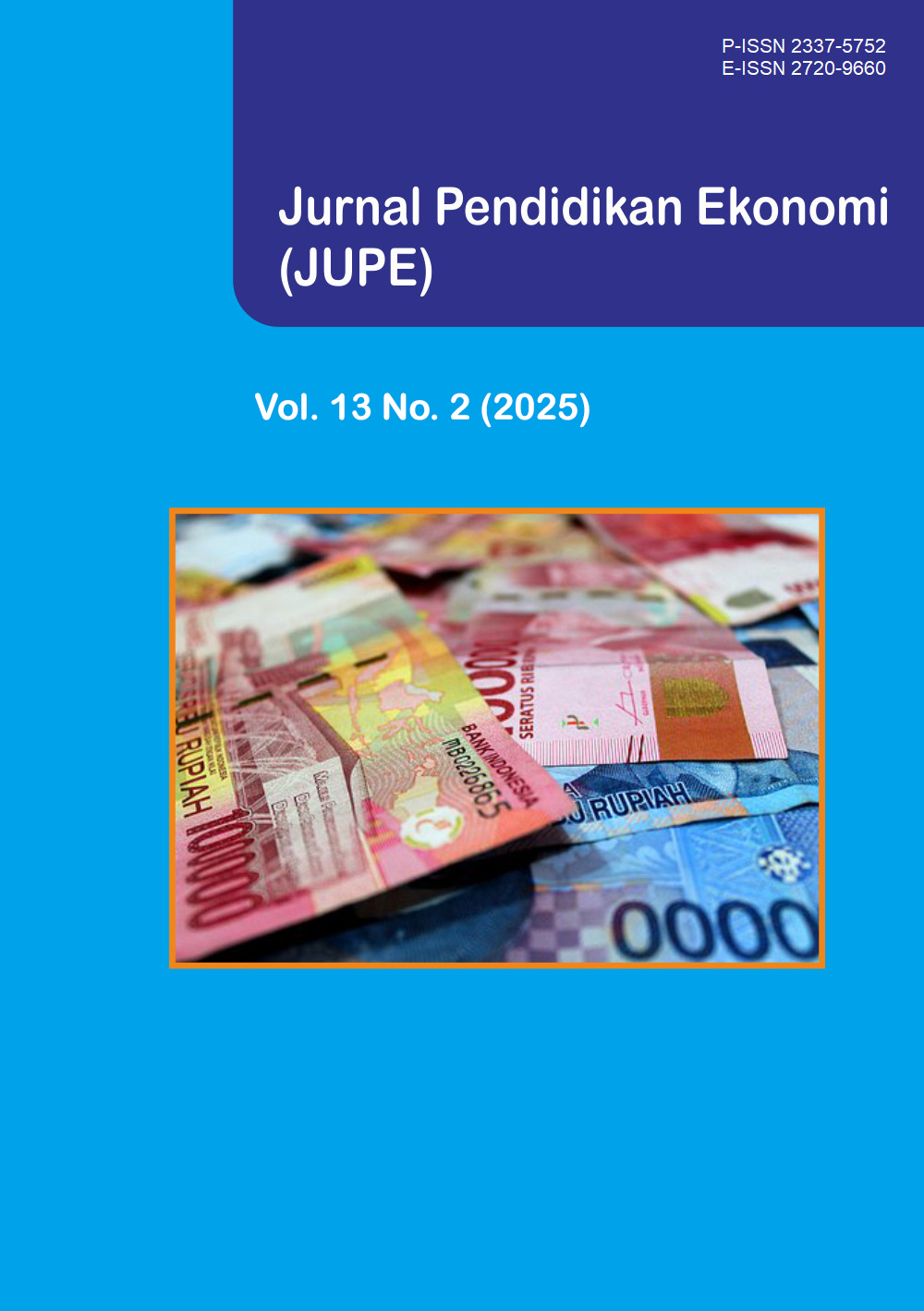Pengaruh kompetensi wirausaha, motivasi berwirausaha, dan lingkungan sosial terhadap minat berwirausaha
DOI:
https://doi.org/10.26740/jupe.v13n2.p138-152Keywords:
Entrepreneurial Competence, Entrepreneurial Motivation, Social Environment, Entrepreneurial InterestAbstract
This study aims to explain the influence of entrepreneurial competence, entrepreneurial motivation, and social environment on interest in entrepreneurship. This research uses a sample of 139 XI IPS students with a quantitative method and Structural Equation Modeling (SEM) analysis, assisted by WarpPLS Version 7.0 software. The results show that entrepreneurial motivation has a significant effect on interest in entrepreneurship of 39.7%. Therefore, it is hoped that schools can pay attention to increasing entrepreneurial motivation in order to enhance students' interest in entrepreneurship. Support for entrepreneurial motivation can be done through several means, including providing contextual learning about entrepreneurship, developing entrepreneurship into extracurricular activities, and utilizing the school's social environment located in industrial areas for industrial visits.Downloads
References
Agus Isdarmawan. (2013). Pola-pola jalur pada.
Agusmiati, D., & Wahyudin, A. (2018). Pengaruh lingkungan keluarga, pengetahuan kewirausahaan, kepribadian, dan motivasi, terhadap minat berwirausaha dengan self efficacy sebagai variabel …. Economic Education Analysis …. https://journal.unnes.ac.id/sju/index.php/eeaj/article/view/28317
Aitab, J. (2018). The Influence of Motivation on Entreprenurial Interest Program Administration Business Students. 1(2005), 8–10.
Ajzen, I. (1991). The Theory of Planned Behavior. Organizational Behavior and Human Decision Processes, 33(1), 52–68. https://doi.org/10.47985/dcidj.475
Ajzen, I. (2002). Perceived behavioral control, self-efficacy, locus of control, and the theory of planned behavior. Journal of Applied Social Psychology, 32(4), 665–683. https://doi.org/10.1111/j.1559-1816.2002.tb00236.x
Amadea, P. T., & Riana, I. G. (2020). Pengaruh Motivasi Berwirausaha, Pengendalian Diri, dan Lingkungan Keluarga terhadap Minat Berwirausaha. E-Jurnal Manajemen, 9(4), 1594–1613.
Ariyanti, A. (2018). Pengaruh Motivasi Dan Mental Berwirausaha Terhadap Minat Berwirausaha Mahasiswa. Jurnal Pengembangan Wiraswasta, 20(2), 95. https://doi.org/10.33370/jpw.v20i2.199
Aslan, A., & Marc, T. (2018). Individual and organizational inhibitors to the development of entrepreneurial competencies in universities. Research Policy, 47(2), 363–378. https://doi.org/10.1016/j.respol.2017.11.008
Bartha, Z. (2019). The social dimension of the entrepreneurial motivation in the central and Eastern European countries. Entrepreneurial Business and Economics Review, 7(1), 9–27. https://doi.org/10.15678/EBER.2019.070101
Bazan, C. (2020). A systematic literature review of the influence of the university’s environment and support system on the precursors of social entrepreneurial intention of students. In Journal of Innovation and Entrepreneurship (Vol. 9, Issue 1). https://doi.org/10.1186/s13731-020-0116-9
Bazan, C. (2022). Effect of the University’s Environment and Support System on Subjective Social Norms as Precursor of the Entrepreneurial Intention of Students. SAGE Open, 12(4), 1–20. https://doi.org/10.1177/21582440221129105
Bonesso, S., Gerli, F., Pizzi, C., & Cortellazzo, L. (2018). Students ’ Entrepreneurial Intentions : The Role of Prior Learning Experiences and Emotional , Social , and Cognitive Competencies *. 00(00), 1–28. https://doi.org/10.1111/jsbm.12399
Botha, M., & Taljaard, A. (2021). Exploring the Entrepreneurial Intention-Competency Model for Nascent Entrepreneurs: Insights From a Developing Country Context. Frontiers in Psychology, 12(July). https://doi.org/10.3389/fpsyg.2021.516120
David. (2015). Modul Metode Penelitian Universitas Kristen Petra. Dimensi Interior, 8(1), 44–51. publication.petra.ac.id/index.php/sastra-tionghoa/article/view/121
Díaz-Casero, J. C., Ferreira, J. J. M., Mogollón, R. H., & Raposo, M. L. B. (2013). Influence of institutional environment on entrepreneurial intention: A comparative study of two countries university students. International Entrepreneurship and Management Journal, 8(1), 55–74. https://doi.org/10.1007/s11365-009-0134-3
Eijdenberg, E. L. (2021). Fluid Entrepreneurial Motivations in Tanzania. Journal of African Business, 22(2), 171–189. https://doi.org/10.1080/15228916.2019.1695191
Fathussyaadah, E., & Ratnasari, Y. (2019). Pengaruh Stres Kerja Dan Kompensasi Terhadap Kinerja Karyawan di Koperasi Karya Usaha Mandiri Syariah Cabang Sukabumi. Jurnal Ekonomak, V(2), 16–35.
Fishbein, M., & Ajzen, I. (1975). Belief, Attitude, Intention, and Behavior: An Introduction to Theory and Research. Addison-Wesley Publishing Company. https://books.google.co.id/books?id=8o0QAQAAIAAJ
Hajli, N. (2018). Ethical Environment in the Online Communities by Information Credibility: A Social Media Perspective. Journal of Business Ethics, 149(4), 799–810. https://doi.org/10.1007/s10551-016-3036-7
Halberstadt, J. (2019). Skills and knowledge management in higher education: how service learning can contribute to social entrepreneurial competence development. Journal of Knowledge Management, 23(10), 1925–1948. https://doi.org/10.1108/JKM-12-2018-0744
Hans Gery, M. (2024). Pengaruh Motivasi Dan Lingkungan Sosial Terhadap MinatBerwirausaha. Jurnal Ekonomi Dan Bisnis, August, 1–8.
Hassan, A. (2021). Individual entrepreneurial orientation, entrepreneurship education and entrepreneurial intention: The mediating role of entrepreneurial motivations. Industry and Higher Education, 35(4), 403–418. https://doi.org/10.1177/09504222211007051
Henseler, J., Ringle, C. M., & Sarstedt, M. (2015). A new criterion for assessing discriminant validity in variance-based structural equation modeling. Journal of the Academy of Marketing Science, 43(1), 115–135. https://doi.org/10.1007/s11747-014-0403-8
Hidayati, E. N., Martono, T., & Sudarno. (2024). Pengaruh Pendidikan Kewirausahaan, Motivasi Berprestasi, dan Lingkungan Sosial terhadap Intensi Berwirausaha Mahasiswa FKIP UNS Angkatan 2019. Journal on Education, 06(02), 12321–12330. http://jonedu.org/index.php/joe
Iglesias-Sánchez, P. P. (2019). Training entrepreneurial competences with open innovation paradigm in higher education. Sustainability (Switzerland), 11(17). https://doi.org/10.3390/su11174689
Kim-Soon, N., Ahmad, A. R., & Ibrahim, N. N. (2014). Entrepreneurial motivation and entrepreneurship career intention: Case at a Malaysian public university. Proceedings of the 24th International Business Information Management Association Conference - Crafting Global Competitive Economies: 2020 Vision Strategic Planning and Smart Implementation, 1001–1011.
Komarkova, I., Conrads, J., & Collado, A. (2015). Entrepreneurship Competence: An Overview of Existing Concepts. In Policies and Initiatives. depth … (Issue October). https://doi.org/10.2791/067979
KontanNews. (2022). Krisis Ekonomi 2023. Kontan.Co.Id. https://insight.kontan.co.id/news/krisis-ekonomi-2023
Kusumawijaya, I. K., & Astuti, P. D. (2021). Mediating role of entrepreneurial competencies: Influence of personality traits on entrepreneurial intention. Problems and Perspectives in Management, 19(3), 211–220. https://doi.org/10.21511/ppm.19(3).2021.18
Kweon, B. S., Ellis, C. D., Lee, J., & Jacobs, K. (2017). The link between school environments and student academic performance. Urban Forestry and Urban Greening, 23, 35–43. https://doi.org/10.1016/j.ufug.2017.02.002
Lang, C. (2019). The entrepreneurial motivations, cognitive factors, and barriers to become a fashion entrepreneur: A direction to curriculum development for fashion entrepreneurship education. International Journal of Fashion Design, Technology and Education, 12(2), 235–246. https://doi.org/10.1080/17543266.2019.1581844
Lans, T. (2018). Towards more synergy in entrepreneurial competence research in entrepreneurship education. In A Research Agenda for Entrepreneurship Education (pp. 224–242). https://api.elsevier.com/content/abstract/scopus_id/85075552141
Liputan6. (2023). Indonesia Mau Jadi Negara Maju, Kejar Dulu Jumlah Pengusaha 4 Persen Total Penduduk. https://www.liputan6.com/bisnis/read/5229915/indonesia-mau-jadi-negara-maju-kejar-dulu-jumlah-pengusaha-4-persen-total-penduduk
Littlewood, D. (2018). Social Entrepreneurship in South Africa: Exploring the Influence of Environment. Business and Society, 57(3), 525–561. https://doi.org/10.1177/0007650315613293
Luo, L. (2022). Research on the Effect of an Entrepreneurial Environment on College Students’ Entrepreneurial Self-Efficacy: The Mediating Effect of Entrepreneurial Competence and Moderating Effect of Entrepreneurial Education. Sustainability (Switzerland), 14(11). https://doi.org/10.3390/su14116744
Lv, Y. (2021). How Entrepreneurship Education at Universities Influences Entrepreneurial Intention: Mediating Effect Based on Entrepreneurial Competence. Frontiers in Psychology, 12. https://doi.org/10.3389/fpsyg.2021.655868
Mahto, R. V. (2018). Entrepreneurial motivation: a non-entrepreneur’s journey to become an entrepreneur. International Entrepreneurship and Management Journal, 14(3), 513–526. https://doi.org/10.1007/s11365-018-0513-8
Makai, A. L., & Dory, T. (2023). Perceived university support and environment as a factor of entrepreneurial intention: Evidence from Western Transdanubia Region. PLoS ONE, 18(6 June), 1–24. https://doi.org/10.1371/journal.pone.0283850
Malebana, M. J. (2021). The Effect Of Entrepreneurial Motivation On Entrepreneurial Intention Of South African Rural Youth. Academy of Entrepreneurship Journal, 27(SpecialIssue 3), 1–14.
Murnieks, C. Y., Klotz, A. C., & Shepherd, D. A. (2020). Entrepreneurial motivation: A review of the literature and an agenda for future research. Journal of Organizational Behavior, 41(2), 115–143. https://doi.org/10.1002/job.2374
NarasiTVNews. (2022). Resesi Dunia 2023 Ancam Pertumbuhann Ekonomi Indonesia, Pakar: Mestinya Jaga Harga BBM. Narasi.Tv. https://narasi.tv/read/narasi-daily/resesi-dunia-2023-ancam-pertumbuhan-ekonomi-indonesia-pakar-mestinya-jaga-harga-bbm
Nasution, D. A. D., Erlina, E., & Muda, I. (2020). Dampak Pandemi COVID-19 terhadap Perekonomian Indonesia. Jurnal Benefita, 5(2), 212. https://doi.org/10.22216/jbe.v5i2.5313
Ngoasong, M. Z. (2017). Digital entrepreneurship in a resource-scarce context. https://doi.org/10.1108/JSBED-01-2017-0014
Octavionica, A. (2016). PENGARUHMOTIVASI BERWIRAUSAHA SERTA LINGKUNGAN INTERNAL DAN LINGKUNGAN EKSTERNAL TERHADAP MINAT BERWIRAUSAHA MAHASISWA PENDIDIKAN EKONOMI UNIVERSITAS lAMPUNG. 4(June), 2016.
Osakede, U. A., Lawanson, A. O., & Sobowale, D. A. (2017). Entrepreneurial interest and academic performance in Nigeria: evidence from undergraduate students in the University of Ibadan. Journal of Innovation and Entrepreneurship, 6(1). https://doi.org/10.1186/s13731-017-0079-7
Portuguez Castro, M., & Gómez Zermeño, M. G. (2021). Identifying entrepreneurial interest and skills among university students. Sustainability (Switzerland), 13(13). https://doi.org/10.3390/su13136995
Purnomo, B. A. (2017). Efektivitas Pelatihan Kewirausahaan dalam Meningkatkan Pengathuan dan Motivasi Berwirausaha pada Penyandang Tunarungu. Jurnal Manajemen Dan Bisnis, 1(1), 21–30.
Rajabi, R. (2018). Entrepreneurial motivation as a key salesperson competence: trait antecedents and performance consequences. Journal of Business and Industrial Marketing, 33(4), 405–416. https://doi.org/10.1108/JBIM-12-2016-0278
Reawaruw, J. M. (2012). PENGARUH FAKTOR – FAKTOR EKONOMI TERHADAP INFLASI DI INDONESIA PASCA-KRISIS KEUANGAN. 73–84.
Rezaeizadeh, M., Hoga, M., Reilly, J. O., & Cunningham, J. (2016). Core Entrepreneurial Competencies and their Interdependencies : Insights from a Study of Irish and Iranian Entrepreneurs , University Students and Academics Please cite as RezaeiZadeh , M ., Hogan , M ., O ’ Reilly , J ., Cunningham , J ., & Murphy , E . . Im, 1–38. https://doi.org/10.1007/s11365-016-0390-y
Rika Widianita, D. (2023). PENGARUH COMPETENCE ENTREPRENEURSHIP, MOTIVATION ENTREPRENEURSHIP DAN SELF-EFFICACY TERHADAP MINAT BERWIRAUSAHA MAHASISWA FISIP UNIVERSITAS 17 AGUSTUS 1945 SURABAYA. AT-TAWASSUTH: Jurnal Ekonomi Islam, VIII(I), 1–19.
Rosali, E. S., Pinem, R. J., Sudirman, A., & Widiastuti, I. (2020). Metodologi Penelitian: Pendekatan Multidisipliner.
Rus-Casas, C. (2020). The impact of the entrepreneurship promotion programs and the social networks on the sustainability entrepreneurial motivation of engineering students. Sustainability (Switzerland), 12(12). https://doi.org/10.3390/SU12124935
Salim, A., & Purnamasari, A. (2021). Pengaruh Inflasi Terhadap Pertumbuhan Ekonomi Indonesia Anggun Purnamasari. www.bps.go.id,
Sánchez, J. C. (2011). University training for entrepreneurial competencies: Its impact on intention of venture creation. International Entrepreneurship and Management Journal, 7(2), 239–254. https://doi.org/10.1007/s11365-010-0156-x
Saoula, O., Shamim, A., Ahmad, M. J., & Abid, M. F. (2023). Do entrepreneurial self-efficacy, entrepreneurial motivation, and family support enhance entrepreneurial intention? The mediating role of entrepreneurial education. Asia Pacific Journal of Innovation and Entrepreneurship. https://doi.org/10.1108/apjie-06-2022-0055
Sheu, H.-B., & Phrasavath, L. (2019). Social cognitive career theory. Contemporary Theories of Career Development, September, 47–60. https://doi.org/10.4324/9781315276175-6
Simmou, W., Sameer, I., Hussainey, K., & Simmou, S. (2023). Sociocultural factors and social entrepreneurial intention during the COVID-19 pandemic: Preliminary evidence from developing countries. In International Entrepreneurship and Management Journal (Issue 0123456789). Springer US. https://doi.org/10.1007/s11365-023-00858-1
Siregar, Z. A., & Marwan. (2020). The Influence of Family Environment, Entrepreneurship Knowledge and Entrepreneurship Motivation on Students’ Entrepreneurship Interest of Islamic Education Management Program of Universitas Islam Negeri Sumatera Utara. 124(December 2018), 566–574. https://doi.org/10.2991/aebmr.k.200305.120
Smith, G. L. (2017). The association between social support and physical activity in older adults: A systematic review. In International Journal of Behavioral Nutrition and Physical Activity (Vol. 14, Issue 1). https://doi.org/10.1186/s12966-017-0509-8
Solimun, D. I., Fernandes, D. A. A. R., & Nurjannah. (2017). Metode Statistika Multivariat Pemodelan Persamaan Struktural (SEM) Pendekatan WarpPLS. https://books.google.co.id/books?id=GrRVDwAAQBAJ&lpg=PP1&hl=id&pg=PP1#v=onepage&q&f=false
Szyf, M., meaney, M. J., & McGowan, P. (2008). The social environment and epigenome. Environmental and Molecular Mutagenesis, 49(7), 46–60.
To, C. K. M., Guaita Martínez, J. M., Orero-Blat, M., & Chau, K. P. (2020). Predicting motivational outcomes in social entrepreneurship: Roles of entrepreneurial self-efficacy and situational fit. Journal of Business Research, 121(August), 209–222. https://doi.org/10.1016/j.jbusres.2020.08.022
Wang, J. (2018). Associations between loneliness and perceived social support and outcomes of mental health problems: A systematic review. BMC Psychiatry, 18(1). https://doi.org/10.1186/s12888-018-1736-5
Widiastuti, I., Wiedy, M., & Ninghardjanti, P. (2019). Pengaruh Lingkungan Masyarakat dan Jenis Pekerjaan Orangtua terhadap Minat Berwirausaha Mahasiswa Pendidikan Administrasi Perkantoran UNS. Jurnal Informasi Dan Komunikasi Administrasi Perkantoran, 3(Februari 2019), 1–14.
Xiang, X., Wang, J., Long, Z., & Huang, Y. (2023). Improving the Entrepreneurial Competence of College Social Entrepreneurs: Digital Government Building, Entrepreneurship Education, and Entrepreneurial Cognition. Sustainability (Switzerland), 15(1), 0–16. https://doi.org/10.3390/su15010069
Xiao, H. (2020). The effects of social support on sleep quality of medical staff treating patients with coronavirus disease 2019(COVID-19) in January and February 2020 in China. Medical Science Monitor, 26. https://doi.org/10.12659/MSM.923549
Yi, S. (2018). What Drives Engineering Students To Be Entrepreneurs? Evidence of Validity for an Entrepreneurial Motivation Scale. Journal of Engineering Education, 107(2), 291–317. https://doi.org/10.1002/jee.20199
Zimmerer, T. W., Scarborough, N. M., & Doug, W. (2008). Essentials of Entrepreneurship and Small Business Management.
Downloads
Published
How to Cite
Issue
Section
License
Copyright (c) 2025 Wahidatul Qomariya, Eka Hendi Andriansyah (Author)

This work is licensed under a Creative Commons Attribution-NonCommercial 4.0 International License.
Copyright
- Authors retain copyright and grant the journal right of first publication with the work simultaneously licensed under a Creative Commons Attribution License that allows others to share the work with an acknowledgment of the work's authorship and initial publication in this journal.
 Abstract views: 296
,
Abstract views: 296
, PDF Downloads: 280
PDF Downloads: 280











